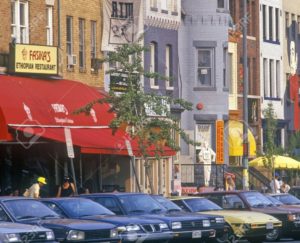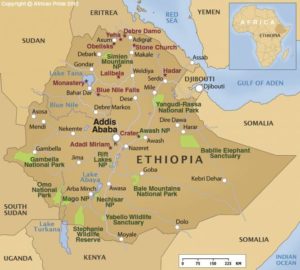A Weekend of Deep Nostalgia, the 25th Anniversary Conference
Many RPCVs had traveled to the conference primarily to be united with old friends. Friday evening, they were involved in hundreds of parties around the city. One street was cordoned off in the Adams Morgan area of D.C. for dancing and food. The restaurants of that area—Meskerem, the Red Sea, The Manilla, and others—were filled with RPCVs.
Loret Miller Ruppe got her family to donate Miller beer for an international festival on the Mall that Sunday afternoon. There was a Caribbean band, I recall, plus the Izalco and Asian dance troupe, and the Kankouran, an African dance troupe, which had hundreds of volunteers up and dancing to African drums. “You could tell the volunteers from Africa by how they danced,” said Mark Hallett (Philippines 1983-85).
Paul Wood (Nepal 1965-67) wrote in the Sebastapol Times and News of his time in D.C., “We could be free with each other in ways that we don’t regularly experience at home. For that weekend, it was perfect fine to be idealistic; perfectly fine to value commitment, to be moved to tears with stories of exemplary service. For that weekend cynicism retreated or was converted.”
For most of us it was also a time to look back and remember.
James Heaton (Malawi 1962-64) wrote, “It’s difficult to estimate the lasting benefits our project may have had on Malawi. The country is still poor….On the other hand, most of the school are now staffed by Malawians. There are tarmac roads throughout the country instead of a few miles here and there. Some ex-Peace Corps volunteers have returned to find former students working as businessmen, teachers, and government officials. One was given a speeding ticket by a former student.”
After the long weekend, at their request, I wrote a short piece for the National Council of Returned Peace Corps Volunteers entitled Places Remembered.
Places Remembered
The Peace Corps doesn’t fly into Addis Ababa today. There are no longer overnight September flights down from Europe, arriving at dawn at the end of the ‘big rains’ when the Ethiopian highlands are blanketed with bright yellow Maskel flowers. PCVs no longer step from the plane and smell for the first time the burning of a hundred thousand eucalyptus fires, smell Africa distilled at eight thousand feet.
From the fall of 1962 until the mid-1970s and the end of Haile Selassie’s long imperial reign, over two thousand five hundred volunteers went to Ethiopia, first as secondary school teachers and later as highway engineers, social workers and nurses.
The volunteers who went to Ethiopia found a country of political intrigue and ethnic diversity more complex than what we’ve ever known at home, and a land where geographic contours are as dramatic as America’s.
We did not all have the same experience of the people and the land. As volunteers, we spanned a decade and lived in more than two hundred towns and villages. Nevertheless, the three hundred and fifty returned PCVs who attended this reunion shared more than we might have imagined.
It was a weekend of deep nostalgia. We went to Washington to see each other, then were surprised at how much we wanted to see each other.
We wanted to find out what happened to Ethiopia and her people, and we wondered why this country and experience has lingered so strongly in our memory. What was it about the Peace Corps, about Ethiopia, that has meant so much in our lives?
The answer is, I believe, that once a long time ago, when we were young and believed we could make a difference, we flew into the Horn of Africa and touched this world firsthand, touched it where it burns, and we have never healed.
John,
My volunteer days in Ethiopia ended in 1965 but I still get a small thrill when I hear a passing stranger speaking Amharic. Why? I arrived in country with 140 volunteers on September 11, 1963 which was New Year’s Day. As luck was with me, I was the first off the plane and was greeted by the American ambassador. Excited to be in Addis Ababa and Africa, I went walking and spoke in Amharic to a well dressed man “Markato yet no? Where is the market? He replied in English “speak English” his name has long been forgotten but not his kindness. He asked me to accompany him to the home of a friend where I had my first taste of injera wat, the spicy national dish
Now, nearly fifty five years later, Ethiopians still ask me (because of my brown skin)
Anta,, are you a habersha? (one of us) Yes, I always reply.
Memories, that’s what makes life so special. The 25th was the best for me…we started our celebration in Los Angeles at the Peace Corps recruiting office, then off to DC and our March to Arlington behind our country of service. What a proud moment, with old and new friends telling our “war stories!”
The 25th Anniversary also opened up my employer, Los Angeles County to set up our own recruitment booth…we hired several former Volunteers right on the spot…a first for Los Angeles County. Two of my bosses believed in the Peace Corps, a Republican and a Democrat, their brothers were former Volunteers.
The 40th was a great Anniversary…but the 25th set the spark that made a statement loud and clear…”we are Returned Peace Corps Volunteers!”
Bob Arias
Colombia, 1964-1966